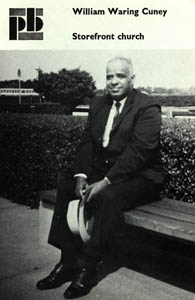The Resurrection Issue
Volume 14:3, Summer 2013
MY LORD, WHAT A MORNING
Oh, my Lord
What a morning,
Oh, my Lord,
What a feeling,
When Jack Johnson
Turned Jim Jeffries
Snow-white face
Up to the ceiling.
Yes, my Lord,
Fighting is wrong,
But what an uppercut.
Oh, my Lord,
What a morning,
Oh, my Lord
What a feeling,
When Jack Johnson
Turned Jim Jeffries
Lily-white face
Up to the ceiling.
Oh, my Lord
What a morning,
Oh, my Lord
Take care of Jack.
Keep him, Lord
As you made him,
Big, and strong, and black.
 CHARLES PARKER, 1925-1955
CHARLES PARKER, 1925-1955
Listen,
This here
Is what
Charlie
Did
To the Blues.
Listen,
That there
Is what
Charlie
Did
To the Blues.
This here,
bid-dle-dee-dee
bid-dle-dee-dee
bopsheep
have you any cool?
bahdada
one horn full.
Charlie
Filled the Blues
With
Curly-cues.
Thats what
Charlie
Did
To the Blues.
Play
That again
Drop
A nickel in,
Charlies
Dead,
Charlies
Gone,
But
John Burkes
Carried on.
Drop
A nickel in,
Give
The platter
A spin,
Lets listen
To what
Charlie
Did
To the Blues.
THE NEIGHBORS STOOD ON THE CORNER
The neighbors
Stood on the corner
In front of the building,
Where the night before
A man had turned on the gas.
Well, his troubles are over,
His worries are over.
Me, Ill stay here with troubles,
Whats new about worry?
He was overseas
Colored, and in the army
You know what that did to our boys.
They say his wife left him
Two little girls were busy with chalk
Marking up the pavement,
In front of the building
Where the night before
A man turned on the gas.
Another little girl
Who was bouncing a rubber ball
Bumped into a pregnant charwoman
On the way home from the night shift.
Excuse me, lady,
The little girl said,
We are going to play a game,
Excuse me.
COUPLES
There are no statistics
On these couples.
You see them, now and then,
Although you cant tell them
From other couples, by looking.
One in ten thousand?
One couple out of
Maybe a million couples?
Who knows?
There are no statistics.
It is a way with two people
A woman and her man.
People who know them say,
They are as close as the hands
Of a clock at midnight,
They are like white on rice.
WOMEN AND KITCHENS
No kitchen
Is big enough
For two women.
If you build a kitchen
A city block long
By a city street wide,
It will be too small
For two women.
They can be sisters,
They can be friends.
They can be a girl
And her mother-in-law.
They can be strangers,
Or a servant
And the lady she works for.
It makes no difference.
A house with
Two women in it
Needs two kitchens.
A dance hall
Has room for many women.
So has a bargain basement.
Kitchens are different.
There should be a sign
Above all kitchen doors:
Room for one woman only.
William Waring Cuney (May 6, 1906—June 30, 1976) is the author of two books of poems, both released late in his life: Storefront Church (1973), published in London, and Puzzles (1960), published in Holland. Born and raised in DC, he attended DC Public Schools, Howard University, and Lincoln College in Pennsylvania. With Langston Hughes and Bruce McM. Wright, he co-edited Lincoln University Poets: Centennial Anthology (1954). Individual poems of his were included in several anthologies, including Caroling Dusk, edited by Countee Cullen, and The Book of American Negro Poetry, edited by James Weldon Johnson. He was active in the literary salon of Georgia Douglas Johnson, and a poem of his, "No Images," shared first prize in a national poetry competition sponsored by Opportunity Magazine in 1926, when he was 18 years old. The following year, two of his poems won honorable mentions in that same competition. Cuney was an accomplished musician and composer as well as a poet; after graduating from Lincoln, he attended the New England Conservatory of Music in Boston and the Conservatory in Rome, although he never performed professionally. In the 1930s, several of his poems were set to music by Al Haig and Nina Simone, and recorded on the album Southern Exposure by Josh White, considered one of the first musical recordings of the Civil Rights movement. Cuney served in the army in WWII, as a technical sergeant in the South Pacific, earning three bronze battle stars. After the war, he settled in New York, and remained largely out of public view. It is not known if his reclusive lifestyle at the end of his life was by choice, or the result of post-traumatic stress, or some other personal reason, but it is in direct contrast to the deep friendships of his early days in DC, when many writers, including Georgia Douglas Johnson, Jessie Redmon Fauset, and Langston Hughes spoke so warmly of his friendship, encouragement, and selfless support of others. To read more about this author: Brian Gilmore on Waring Cuney: Memorial Issue